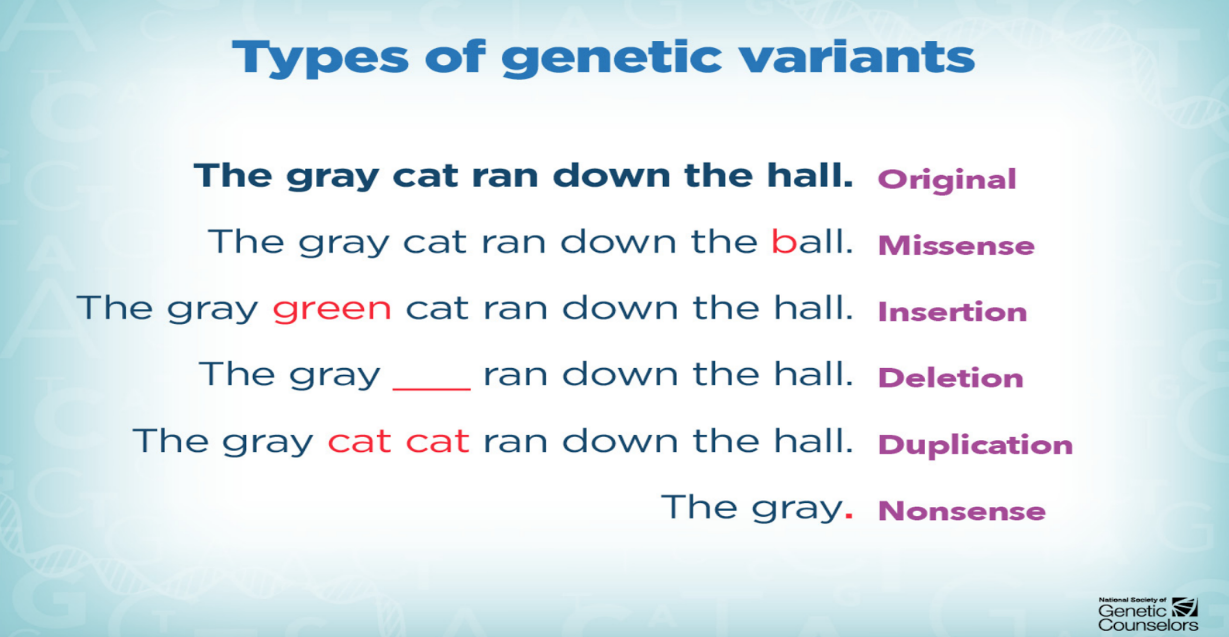Types of Genetic Variants
Duchenne is caused by genetic changes (often called variants or mutations) within the dystrophin gene. A gene is made up of coding regions called exons, and the areas in between exons are called introns. Dystrophin has 79 exons, which makes it one of the largest genes in the body.
Making the dystrophin protein from the gene involves several steps. One of the first steps is removing the introns and fitting the exons together, 1-79, like puzzle pieces.

If there is a missing piece within the dystrophin gene (deletion) or an extra piece (duplication), your body can have difficulty making dystrophin.
What are the most common variant in the dystrophin gene?
Since the dystrophin gene is one of the largest genes in our body, it can frequently acquire genetic changes (variants). Thousands of different variants have been reported in the dystrophin gene. It is important to remember that everyone carries variants in some of our genes, although we usually do not know it because the variants do not affect us in any noticeable way.
This table shows the different types of genetic variants that can happen in the dystrophin gene, and how common the different genetic variants occur in people with Duchenne and Becker.
| Type of genetic variants | How often variant causes Duchenne | How often variant causes Becker |
|---|---|---|
| Large deletions | 60-70% of cases | 80-85% of cases |
| Large duplications | 10% of cases | 5-10% of cases |
| Point mutations and other small changes (including ‘nonsense’ variants) | 15-30% of cases | 10-15% of cases |
As the table shows, most cases of Duchenne and Becker are caused by large deletions. Continue reading for a brief explanation of each type of genetic variant:

- Deletions occur when pieces of the gene (called exons) are missing. Deletions of one or more exons are the most common type of genetic variants. Since there are a total of 79 exons in the dystrophin gene, there are many different deletions that can occur. However, there are certain areas of the gene that are more likely to have a deletion, and these areas are called “hot spots”. Exons 44-55 are a hot spot region for deletions. If you know your/your child’s genetic change (variant) is an exon deletion, our educational Exon Deletion Tool can help you understand if you/your child may be a candidate for an exon skipping therapy.
- Duplications occur when one or more exons within the gene are doubled. Duplications are not as common as deletions. Like deletions, duplications can occur throughout all 79 exons of the dystrophin gene.
- Point mutations are smaller changes in the gene that do not involve an entire exon. Sometimes just one letter in the DNA code is missing (deleted), doubled (duplicated), or changed. One of the most common point mutations is called a nonsense variants. Nonsense variants cause a premature stop in the gene which results in little or no dystrophin protein production.
What is the difference between in-frame vs out-of-frame errors?
If you or your child have a deletion, you have probably heard the terms in-frame and out-of-frame. Sometimes this is referred to as the reading frame rule.
In-Frame
A deletion is in-frame if the reading frame of the gene is preserved and not disrupted, so some dystrophin protein can be made. The protein may be shorter than normal, but it is still functional. In-frame deletions typically result in Becker muscular dystrophy, which usually has a more mild presentation (compared to Duchenne) because there is some dystrophin protein present in the cells.
Out-of-Frame
A deletion is out-of-frame if the reading frame is completely disrupted, so that no dystrophin protein can be made. Out-of-frame deletions typically result in Duchenne muscular dystrophy, which usually has a more severe presentation (compared to Becker) because there is no dystrophin protein present in the cells.
It is important to remember that this reading frame rule is not always perfect. There are some out-of-frame deletions that cause Becker, and some in-frame deletions that cause Duchenne. Sometimes a child’s diagnosis will be “intermediate or unclear” until the child grows older and their progression can be observed. Please speak with your doctor or genetic counselor if you have questions.
Can you predict progression based on genetic variant?
Duchenne progresses differently for every person, thus every person living with Duchenne will display their own symptoms despite their genetic variant. Even siblings with the same variant may have a very different progression of symptoms. The progression of symptoms through this disease are on a spectrum, from late onset/very mild symptoms to early onset/severe symptoms.
Genotype vs. Phenotype
Genotype is a person’s genetic makeup. In Duchenne, it is the genetic variant that affects the production of dystrophin. Phenotype is how the body chooses to express a specific genotype. In Duchenne, it is the symptoms of how the body is progressing through this diagnosis. It is possible to have a genotype most often associated with Becker, but to have a phenotype more typical of Duchenne, and vice versa.
How do you determine what genetic variant you have?
Genetic testing is now the gold standard for the diagnosis of Duchenne and Becker. Genetic testing will determine what type of genetic variant is present, as well as the specific details of the variant. Genetic testing can also predict if someone is more likely to have Duchenne or Becker. However, as stated previously, predictions of severity based on the genetic variant are not perfect and a person’s symptoms and disease progression must also be considered. Therefore, families must consult with their doctor for their final diagnosis. Sometimes there are individuals who are intermediate because their features fall in between Duchenne and Becker.
PPMD is able to provide free genetic testing to help eligible individuals determine their genetic variant through our Decode Duchenne genetic testing program. The application and testing process is fast and easy. Learn more about PPMD’s free genetic testing program.
Why is it so important to know your genetic variant?
There are three reasons why it is imperative to know your genetic variant:
- To confirm your diagnosis: Genetic testing will confirm if you have Duchenne or Becker, or if you may have another type of muscular dystrophy that shares some of the same features as Duchenne or Becker.
- To enable testing of family members: Once the genetic variant in a family is known, then other family members can be tested to determine if they are carriers of the gene variant. Genetic testing is the best method for performing accurate carrier testing.
- To determine what variant-specific therapies may benefit you: Many therapies in development and/or approved for Duchenne are variant-specific, meaning they will only benefit individuals with certain variants. You must know your genetic variant in order to participate in a clinical trial and to access any current or future variant-specific therapies.





